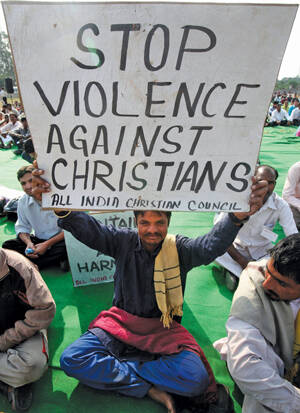Bishop Howard J. Hubbard of Albany, chair of the U.S. bishop’s International Justice and Peace office, called on Oct. 27 for the reauthorization of the U.S. Commission on International Religious Freedom, which “plays a vital role in preserving human dignity and human rights around the globe.” • On Oct. 28 Catholic bishops in India’s Karnataka State called for the dismissal of “false cases” against Christians who had been arrested after protesting attacks on three dozen churches in 2008. • On Oct. 31 the U.S. Supreme Court declined to hear the appeal of a federal court ruling in Utah that memorial crosses along state highways were unconstitutional. • Ireland’s Association of Catholic Priests marked its first anniversary with a meeting in Dublin on Oct. 4 that included calls for women’s ordination and an end to mandatory celibacy. • Wisconsin’s bishops urged parishioners to keep guns out of church after a state law allowing residents to carry concealed weapons went into effect on Nov. 1. • A study by the European Central Bank says Catholics are more likely to support government intervention in the economy than Protestants and also have a stronger preference for sharing wealth equally.
News Briefs
Show Comments (
)
Comments are automatically closed two weeks after an article's initial publication. See our comments policy for more.
The latest from america
Do the social networks that Catholic influencers are forming online reflect the values of the Gospel or those of the platform?
Whenever I teach a seminar on T. S. Eliot’s work, I spend the first day of class on ‘Marina.’
The figures represent a huge increase in abortion within a decade, since in 2012 abortion ended 20.84% of conceptions—a fifth of all pregnancies.
Serving life by caring for others is “the supreme law” that comes before all of society’s rules, Pope Leo XIV said in his first Angelus address at the papal summer residence.








